Right on cue, with the precision timing of a Japanese train, New Zealand’s mainstream and social media networks erupted after the All Blacks 40-25 loss to France, with a deafening chorus calling for the coaching team to be sacked.
This is how life is in New Zealand – the All Blacks have a bumpy year, lose three tests, and everyone goes straight for the axe, determined to believe that every real and perceived problem within the team could be fixed by chopping the coaching team.
It’s a land of extremes – one where there is little faith or trust that a coaching group can evolve and adapt as if they all come into the job with one view on how to play and it either works or it doesn’t.
This is how it was in 2009 when the All Blacks lost four of their first eight tests. The rugby public and most of the media had opposed the decision to re-appoint Graham Henry, Wayne Smith and Steve Hansen after they had led the All Blacks to their worst World Cup campaign in history in 2007.
Most of the nation wanted change after that tournament and when they didn’t get it and Henry’s All Blacks went backwards in 2009, there was widespread anger and endless commentaries about how the game would be forever broken if the New Zealand Rugby board didn’t take swift and dramatic action.
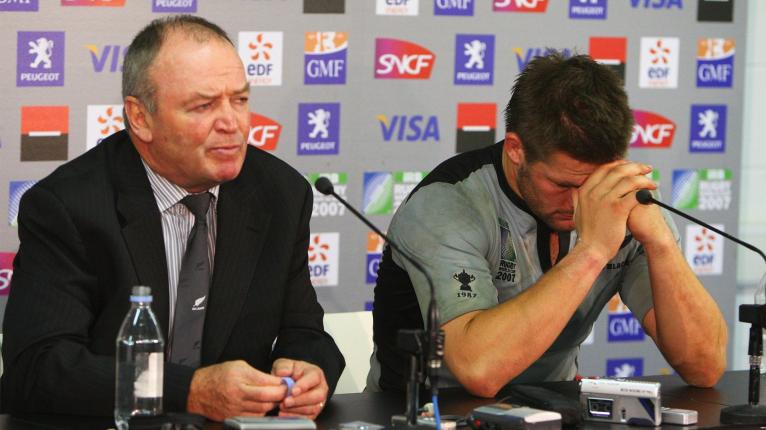
NZR didn’t fire Henry – they extended his contract for another two years later that year and the All Blacks only lost three of their next 26 tests and won the World Cup.
Being patient and backing their initial judgement paid off for the NZR. They resisted public pressure to fire Henry in both 2007 and 2009 and they were rewarded for their loyalty.
It seemed like a breakthrough moment where the penny would drop that firing the coach is not always the right thing to do and that coaches don’t come with just the one idea – they can evolve and change the way they want their team to play.
But then the All Blacks lost their last test of the year and it was all angry mob and pitchforks again.
Like Henry in 2007, Ian Foster was not the preferred choice of either the media or the public when he was appointed in late 2019. There was more external support for Crusaders coach Scott Robertson to be given the All Blacks job.
When the All Blacks finished 2020 with three wins, a draw and two defeats – one of those being an historic first against the Pumas – NZR’s board decided to not reward Foster with an early contract extension through to 2023 as had initially been their plan.
There was a sense that Foster, who had been an assistant for eight years, was perhaps going to deliver more of the same and that the time had come for something different: for Robertson, who had steered the Crusaders to three consecutive Super Rugby titles to be promoted and bring a wave of fresh ideas.
When the All Blacks finished 2020 with three wins, a draw and two defeats – one of those being an historic first against the Pumas – NZR’s board decided to not reward Foster with an early contract extension through to 2023 as had initially been their plan.
The board decided they wanted to wait until the end of 2021 to see how the team fared against the likes of South Africa, Ireland, Wales and France.
The feeling earlier this year was that the All Blacks needed to be exposed to those more physical sides to get a better handle on how Foster and his coaching team were set up to handle the power of the likes of South Africa.
They were intent to hold off making a decision until early December, but when the All Blacks secured the Bledisloe Cup ahead of taking on a 10-test offshore programme as a result of the Covid outbreak, the board decided to bring forward their plans.
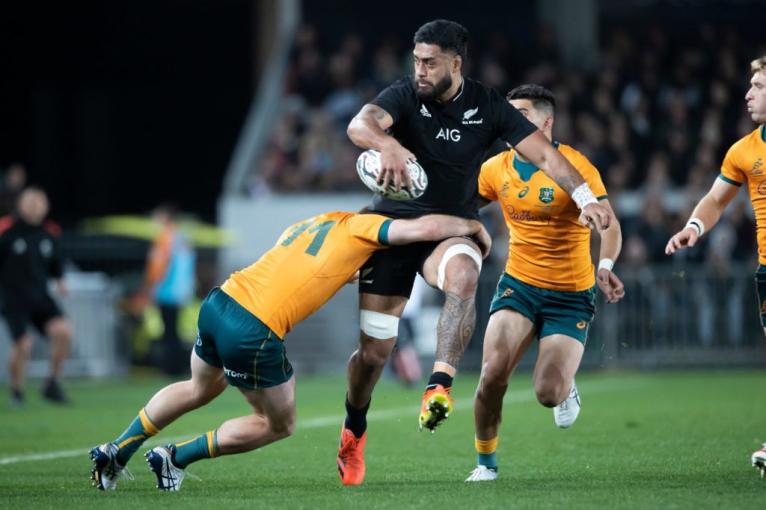
The players had made it clear they didn’t want to leave New Zealand without certainty about the coaching group’s future and with some members of Foster’s management fielding offers from other international sides, the NZR board approved two-year extensions in late August.
The All Blacks were sitting on a played five, won five record for 2021 when the decision was made. They have come home from that 10-test tour with seven victories and three defeats, meaning their overall stats for 2021 are played 15 won 12, lost three.
South Africa lost five tests over the same period and Australia seven and yet Foster has arrived back in New Zealand with a mob baying for his blood.
A New Zealand Herald poll, which garnered 18,000-plus responses, showed 80 per cent backed sacking Foster. Consecutive losses to Ireland and France have persuaded many to argue that the NZR board needs to backtrack, rescind its contract offer and bring in Robertson now.
In a quirk of timing, Super Rugby squads for 2022 were announced 24 hours after the All Blacks loss in Paris which meant Robertson was fronting media. Asked to give his views on the All Blacks’ season, he said: “Look, I observe like everyone else, but I will hold my judgement on it.
Essentially, NZR have to work out where the All Blacks really sit at the moment and whether there is enough basis to believe they will develop far enough and fast enough under Foster if they stick with him for another two years.
“With the All Blacks stuff, I will leave my point of view private property. They are hurting at the moment, I have got my opinions on it, but it’s probably not the right time to express them.”
The question now for NZR to ask is whether they were right to re-appoint Foster. It worked with Henry, but that doesn’t mean being patient with Foster will deliver the same rewards.
Essentially, NZR have to work out where the All Blacks really sit at the moment and whether there is enough basis to believe they will develop far enough and fast enough under Foster if they stick with him for another two years.
To come up with the right answer requires perspective and astute analysis. The All Blacks season was not the disaster the anti-Foster brigade are making out.
The team played some sharp and well thought out attacking rugby, scoring a world record number of tries in a calendar year.
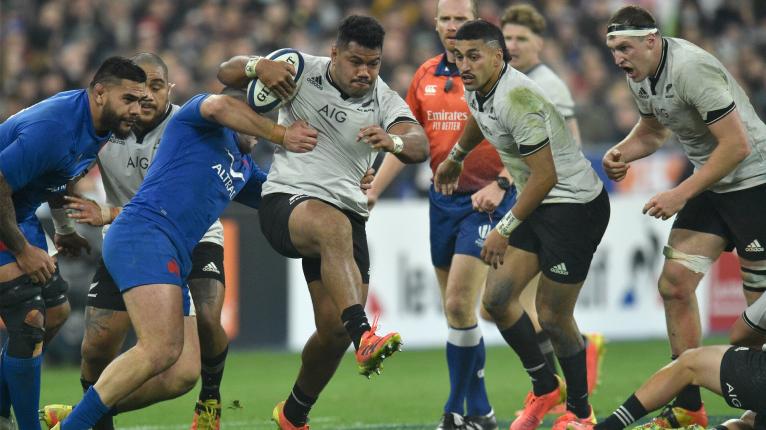
They discovered a handful of new players such as Samisoni Taukei’aho, Ethan Blackadder, Finlay Christie and Quinn Tupaea and won the Rugby Championship.
They also displayed an incredible depth of character to make 238 tackles in Dublin to stay in the fight and an equally impressive resistance to claw their way back from 24-6 down in Paris to 27-25 and give themselves a real sniff of victory.
It also has to be factored in that they were away from home for 13 weeks, living in a tight bio-bubble and that the November test window does favour the Northern Hemisphere teams who are fresher at that time of year.
But while the hysterical noises about firing the coaching team can be ignored and some notice taken of the mitigating factors around the unprecedented circumstances that required them to be away from home for so long, it would, however, be dangerous to believe that a good summer break is all the All Blacks need to rejuvenate.
As veteran hooker Dane Coles said after the 40-25 loss to France: “We’ve got to look ourselves in the eye and have those tough conversations we can’t shy away from.
In test footy physicality is your number one mindset. If you don’t have that you can’t get yourself into the game.
All Blacks hooker Dane Cole
“These last two games haven’t been good enough. There’s always an expectation as an All Black to perform and put our hands up, and we haven’t done that the last two weeks.
“I think we’ve blooded some really good players, but when we’ve been put under pressure the last couple of games, it’s not good enough. We need to take everything out of it, dissect it and we need to be better going forward.”
“In test footy physicality is your number one mindset. If you don’t have that you can’t get yourself into the game.”
The three losses the All Blacks suffered all contained similar failings. In each defeat, the All Blacks didn’t retain the ball well enough or do enough with it. They failed to launch consistently effective strike moves; they played behind the gain line, shuffling sideways, and kicked poorly and erratically.
The overall impression was that the team weren’t sure about their strategy. They looked confused about their individual roles and how they fitted into the overall gameplan and there was no certainty about whether the All Blacks wanted to ruck and run or kick and chase and instead they were a botched hybrid.
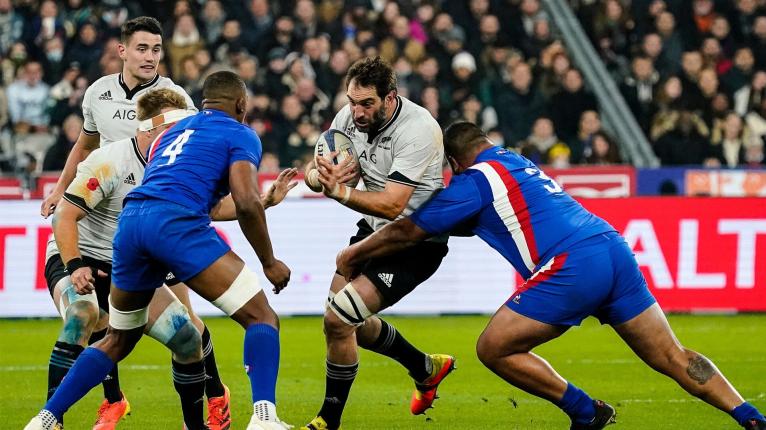
The overall record of 12 wins from 15 games is no reason for alarm, but in the four toughest tests – South Africa twice, Ireland and France – the All Blacks were exposed and only posted one win.
When they were asked hard questions, they didn’t have the answers and the feeling is that the All Blacks are vulnerable when they are under pressure and have not yet built enough resistance, composure and innovation into their game to be effective against the best sides.
Foster, unsurprisingly, in the wake of the loss in Paris, was trying to accentuate the positives of 2021 and state his case for continuing. “If you look at our year, how do I feel about the progress?
“We’ve played more tests than we’ve ever played, and we’ve won 12 out of 15. I think South Africa lost five tests, Australia lost seven. I know we get judged harshly, but we’re making progress.
“We’ve got a good base of players now, we’re growing, but we’re also learning some tough lessons at the end of this long season. Big test matches come down to big moments and we’ve got to get our composure right and perhaps understand our game better. We know there’s still work to do, but we’ve got some good options now.”
In terms of making specific progress in how to play against the best teams who bring forward power, line speed and variation in their defence and attack, there was no discernible evidence the All Blacks made steps forward.
“The one thing you’ve got to do is not get too downhearted by the last two weeks. It hurts like anything and I know we haven’t got the results everyone wants, but I thought tonight we showed better composure in coming back into the game.
“We’ve still got a number of people who are learning what it’s like up here. We’ve learnt some lessons but we’ve got to deal with the pressure game better than what we’re doing at the moment.”
His argument that the All Blacks are not the basket case some would suggest is a fair line to trot out. But the counterpoint is that they are not where they want or need to be and they made the same mistakes against France and Ireland as they did against South Africa.
In terms of making specific progress in how to play against the best teams who bring forward power, line speed and variation in their defence and attack, there was no discernible evidence the All Blacks made steps forward.
They are a good enough and brave enough team to hang in and score opportunistic tries, but they can’t deny they appear to have fallen behind in terms of the basics. In Dublin and Paris, they were chasing the game early – unable to get the ball or keep it.
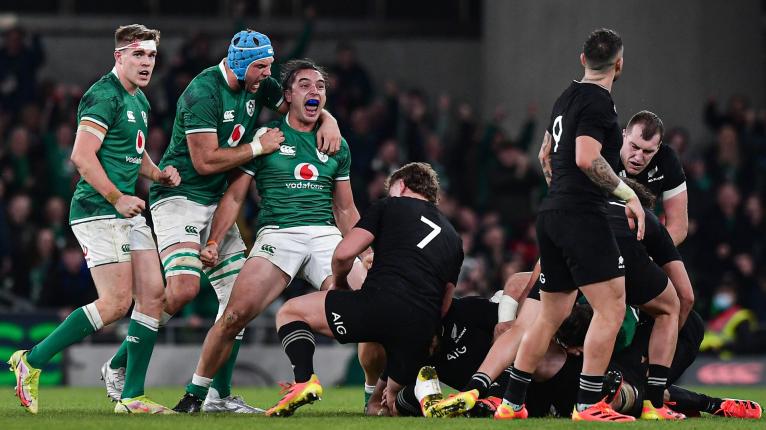
It is small margins, but the All Blacks still need to find a way to ensure they are the team playing the smarter, more innovative rugby next year and on the right side of the big plays.
There is a gap that needs to be bridged, a point Coles made quite emphatically. “For us to be where we want to be we’ve got to step up in that department [physicality]. Teams are coming for us. I don’t have the magic things to make it all good, but we’ve got to sort it out the next couple of years.
“There was a time you could come up here, change players week to week, and still get a couple of wins. Now you need your best team out there every week, and the way these [French] boys are playing, they’ve got a young team but they’re ahead of their years. The experience we had, we probably didn’t show that.”
And that leads back to the fundamental question of whether this coaching team are capable of finding the fresh ideas and new thinking the team needs?
Henry and his team responded to the pressure they were under with innovation. They re-set the team in 2010 and evolved their game plan.
It’s almost certain Foster and his coaching team will be retained and asked to build the element of surprise and jump the All Blacks ahead of everyone else.
But they might be told they have got to deliver evidence instantly because the All Blacks begin next year with a three-test series against Ireland in New Zealand and two away tests in South Africa.
If the All Blacks make the same mistakes in those tests and fail to show any serious innovation, then it might be time to consider a coaching change.


I agree with most of Gregors article.
The Covid situation means we have to cut the AB some slack. They are the only ones with any knowledge of the effects of living only in a hotel room for 3 months.
Having said that - there are genuine concerns:
Great teams have a few things in common: consistent selection, depth in position, evolution of the game plan, and clear structure. The All Blacks under Foster have unfortunately had precious little of most of that. I’m not one to quickly ditch a coach, but this team are still figuring out who is number one and number two in each position. That’s not good enough.
The reason no one trusts foster to improve is that the same weaknesses have been there since 17. There had been no innovation or improvement at all against the tough teams, lessons have not been learned since the semi. Foster is a continuity coach, and late Hansen had already been figured out, we are getting a continuation of bring a flat track bully team.
Covid is being used as an excuse, everyone is effected by it.